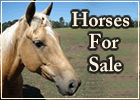

Rearing Up
Rearing up could be related to the bit she is using or how she is handling the reins. It could also be a dental problem. Many bad behaviors have their root in dental issues. We use an Equine Dentist for our dental exams and treatments. I like ones who use power tools because they can be much more accurate than hand filing. There is much more to equine dental treatment than just knocking off some points. The jaws much match properly, the ramps and slopes must be at the proper angle, etc. This should be an annual treatment.
I do not use tie downs because it is just a gimmick that treats the symptom rather than discovering the root cause of the rearing and teaching the horse how to carry himself without rearing.
I teach several gentle methods that prevent rearing by removing the horse's feeling that he needs to rear, none of which employs the use of mechanical gadgets such as tie downs. There is a reason he is rearing. It is our responsibility to discover this reason and remove it, not just short-cut proper training by strapping a tie down on the horse. If the cause of rearing is not removed and he is prevented from rearing by a tie down the adverse behavior will exhibit itself in some other manner such as bolting or bucking.
The tie-down is a band-aid quick fix that really doesn't work in the long run if you want to have any kind of meaningful mutual relationship with your horse.
"For what a horse does under constraint...he does without understanding."
A quote from 1st century Greek master horseman, Xenophon, in his book “The Art of Horsemanship”
I admire you for your dedication in putting in the time and effort to help TK become the brave and dependable trail horse you know he can become. I assure you TK definitely recognizes your devotion to him and your benevolent leadership. He is trying his best to meet you on this journey and he is showing his appreciation for your efforts by trying to do better in all the issues you've addressed with him. Your tireless efforts and hours of ground work and preparation are paying off and will pay great dividends in the future as he gets better and better. You won't always have to put this much time into the ground work phase. At some point, in the not too distant future, your relationship with TK will evolve into an easy-going, casual friendship which has been hammered out on the anvil of shared struggles and mutual devotion. After that the hard work will be over and you'll enjoy just polishing your relationship to a fine patina.
As far as rearing, driving the horse forward might be effective as long as the geography is acceptable and the horse complies by moving forward instead of taking the option of continuing upward and over backward. Rearing is very dangerous so I want to stop the rearing in the first instant through a sure method of lateral flexion using a snaffle bit. As soon as you feel him get light in the front end or just as you feel the front feet come off the ground you would lift and extend one arm toward and off to the outside of his ear on that side and literally hang him up on the side of the bit on the corner of his mouth. The horse has nowhere to go except off to the side which brings his feet back down to the ground. Your other hand drops the rein it was holding so you are holding rein in only one hand. The key here is for your rein hand to be high (at your shoulder height or higher) and slightly out to the side affecting only the corner of the mouth, not the bar of the gum. Most riders want to pull down and to the side but with the rider's hand in a low position the horse can brace his neck and jaw against the bit and still rear up.

Ed Dabney is an internationally acclaimed clinician, presenting horsemanship and riding clinics all over the US and in Europe. In 2007, Ed was named Champion of the East Coast Trainer Challenge Series by Equine Extravaganza. Ed was honored to have been selected by the University of Georgia to teach their senior level Young Horse Training course.
His training articles have appeared in many major national magazines. Ed produces instructional videos and the “Gentle Horsemanship” TV program which has been seen on RFD-TV.
Ed's blending of natural horsemanship and classical equitation has made an indelible mark with students all across the United States and now also in Europe, drawing the attention of serious riders searching for the lightest touch and the deepest connection with their horses irrespective of breed or discipline.


